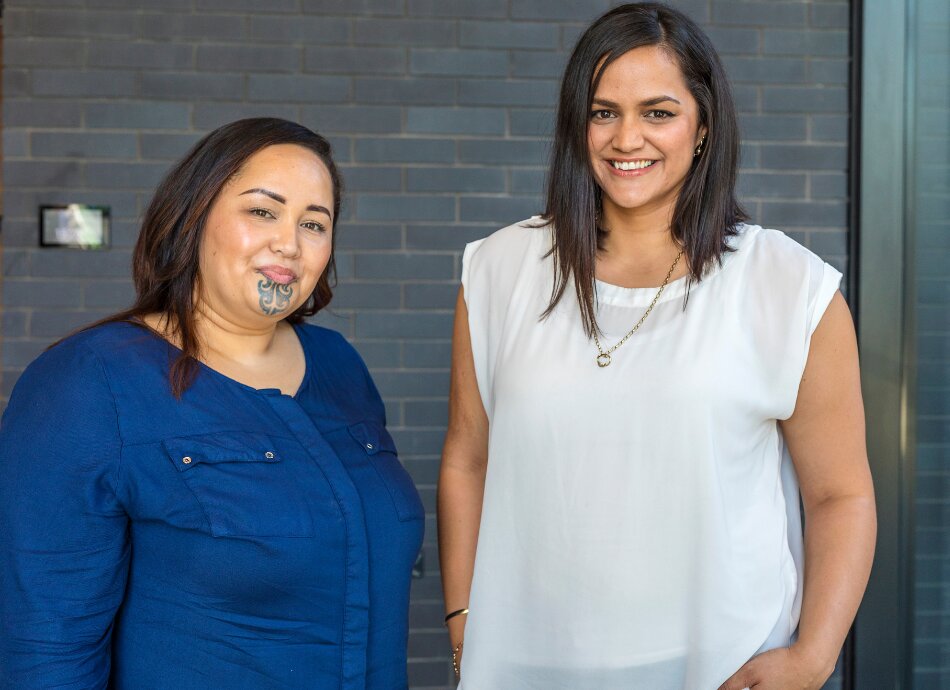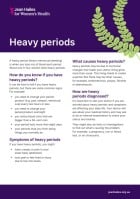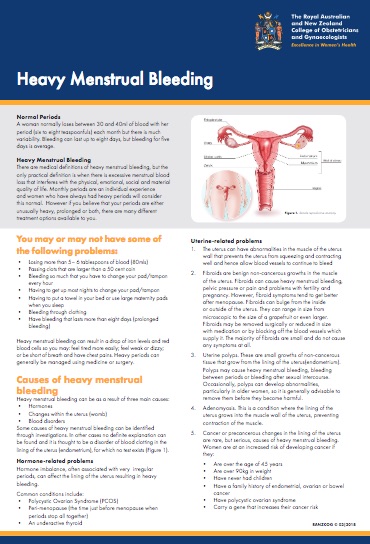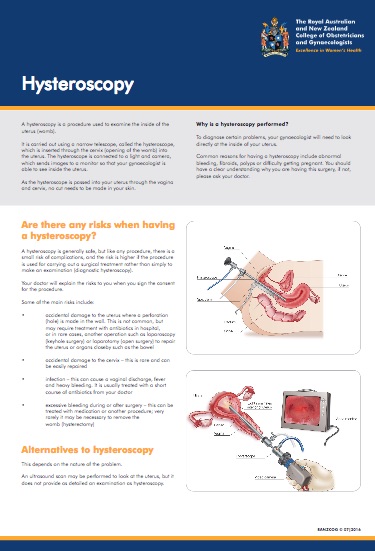If you're a frequent visitor to Healthify, why not share our site with a friend? Don't forget you can also browse Healthify without using your phone data.
Heavy periods
Also known as heavy menstrual bleeding or menorrhagia
Key points about heavy period bleeding
- Heavy periods are when you have more bleeding, or longer bleeding, than is usual and this bleeding disrupts your usual activities.
- The amount of blood lost during a period varies a lot, but if you think your periods are heavy, see your healthcare provider.
- Treatments are available if heavy periods are affecting your daily life. Treatment will depend on the cause of your bleeding.
- Ongoing heavy periods can lead to low blood iron (anaemia).
- Living with heavy period bleeding can be challenging, so getting good support and taking care of your emotional wellbeing is important.

This page is aimed at adults, read more about heavy periods in young people.
Heavy menstrual bleeding (heavy periods) is when you have more bleeding, or longer bleeding, than is usual on an ongoing basis. The amount of bleeding disrupts your physical, social and emotional quality of life and prevents you from doing many of your usual activities.
Video: Heavy periods –what you need to know
Heavy periods may be normal for you, and they don’t always need to be treated, Periods can be heavy at different times, such as when you first start your periods, after pregnancy and leading up to menopause. However, there are also certain conditions that can cause heavy periods (see below).
The amount of blood lost during a period (menstrual cycle) varies a lot between women. This makes it difficult to give a general description of what a heavy period is. The amount of blood lost can also vary at different times in your life, including if you’ve had surgery or take medication.
However, it’s likely that you know how much bleeding is normal for you, and you can tell if this changes.
A good indication that your periods are heavy is if you:
- lose more than 5 to 6 tablespoons of blood (80 mL)
- pass clots that are larger than a 50 cent coin
- bleed so much that you have to change your pad or tampon every hour or empty your menstrual cup more often than is recommended
- have to get up most nights to change your pad or tampon
- have to put a towel in your bed or use large maternity pads when you sleep
- bleed through your clothing
- have bleeding that lasts more than 8 days (prolonged bleeding).
Heavy periods can lead to low iron levels and anaemia. These can cause you to feel tired more easily, feel weak or dizzy, be short of breath or have chest pains.
If you're not sure if your bleeding is heavy or not, try filling out a heavy period diary [JPG, 111 KB] for a a few months.
For most women from 25 to 40 years of age, heavy periods have no underlying cause. It's fairly common for periods to get heavier leading up to the menopause. However, the conditions listed below can sometimes cause heavy periods.
Problems related to your womb (uterus) or ovaries
- Endometrial polyps or uterine fibroids: Endometrial polyps are benign (non-cancerous) growths in the lining of your uterus (womb). Uterine fibroids are also benign and are found in the muscle of your uterus.
- Adenomyosis: This is when the lining of your uterus grows into the muscle wall of the uterus. It’s often present with endometriosis and can result in the same symptoms as endometriosis and fibroids.
- Endometriosis: This is where tissue similar to the tissue that lines your uterus (womb), also grows outside your uterus, such as on your ovaries or fallopian tubes. This may cause heavy periods, as well as period pain, painful sex and chronic pelvic pain. Read more about endometriosis.
- Pelvic inflammatory disease (PID): This is an infection in the pelvic area of your body. Read more about pelvic inflammatory disease.
- Polycystic ovarian syndrome (PCOS): This hormonal condition affects how your ovaries work. Symptoms can include irregular or heavy periods, acne, excess facial or body hair, scalp hair loss and weight gain. Read more about PCOS.
- Endometrial hyperplasia: This is when your endometrium (lining of your uterus) is thicker than usual in response to having too much oestrogen.
- Cancer of the lining of your uterus (endometrial cancer): This is very rare, but can cause heavy periods. Read more about endometrial cancer.
Other medical conditions
- Blood disorders, such as von Willebrand disease.
- Hypothyroidism – an under-active thyroid gland.
- Some other health conditions, such as liver disease or renal (kidney) disease.
Medical treatments
- Copper intra-uterine device (IUD) – this method of contraception can increase blood loss during periods by almost 50%.
- Anticoagulant medicines – these are medicines taken to prevent blood clots.
- Some medicines used for chemotherapy.
- Some herbal supplements can affect your hormones and may affect your periods. These include ginseng, ginkgo and soya.
If you have heavy periods, you might:
- feel tired or dizzy
- have low iron levels due to blood loss
- look pale
- have cramps or pain in your lower tummy (abdomen)
- not be able to do activities you normally do, such as exercise or going to work.
You should see your healthcare provider if:
- your heavy periods are affecting your life
- you've had heavy periods for some time
- you have severe pain during your periods
- you bleed between periods or after sex
- you have heavy periods and other symptoms, such as pain when peeing, pooing or having sex.
Your healthcare provider might do, or advise, some of the following tests:
- A pregnancy test to rule out any pregnancy-related conditions, such as miscarriage or ectopic pregnancy, that can cause heavy bleeding.
- Examination of your cervix to see whether the bleeding is coming from your cervix rather than your uterus.
- Blood tests to look for anaemia, iron levels, thyroid disease or a bleeding disorder.
- An ultrasound (scan) of your uterus and ovaries (preferably done vaginally) to look for abnormalities in your uterus, such as polyps or fibroids.
- Swabs to exclude any pelvic infection.
- Taking a sample (biopsy) of the lining of the uterus to see whether there are any precancerous or cancerous changes.
- Hysteroscopy – this is where the inside of your uterus is examined using a small telescope and sample of the lining of your uterus can be taken at the same time.
You may need to be referred to a specialist (a gynaecologist) for some of these tests.
The choice of treatment will depend on the cause of your bleeding. If a reason for the heavy bleeding is found, such as a fibroid, this will be treated.
Sometimes no cause for heavy periods can be found. In this case there are medicines or surgical options for decreasing the amount of bleeding. Some treatments may stop your periods completely, and others may affect your ability to get pregnant.
When deciding on a treatment, your healthcare provider will take into consideration your age, general health, and whether you require contraception or want to have children. Some treatments are ongoing, and others are done once only. Your healthcare provider will help you to decide what’s best for you.
Medicines
Examples of medicines to treatment heavy periods include:
- a Mirena IUD
- tranexamic acid
- non-steroidal anti-inflammatories (NSAIDs) such as ibuprofen and naproxen
- the combined oral contraceptive pill
- progestogen medicines given either as tablets (eg, norethisterone, medroxyprogesterone acetate) or by 3-monthly injection.
Read more about medicines to treat heavy periods.
Surgical treatments
Surgery is considered if medical treatments aren't possible or haven't been effective. Surgical options include:
- endometrial ablation – this involves removing the lining of your uterus usually by using heat or an electric current
- hysterectomy – an operation to remove all or part of your uterus (womb)
- other surgical options, such as removal of uterine fibroids..
Read more about surgery for heavy periods.
Iron deficiency and anaemia
If you have heavy periods each month, one of the key things to watch out for is low iron levels or iron deficiency. One of the most common causes of iron deficiency is prolonged or heavy periods. This can leave you feeling tired and lacking energy. In some cases, this can even lead to anaemia.
Ask your healthcare provider if you need a blood test to check your ferritin (iron) and full blood count. If your results indicate your iron is low, your healthcare provider may recommend iron supplements.
If you have low iron, you adjust your diet to help boost your iron levels.
- The best source of iron in food is red meat, eg, beef, lamb or venison.
- Eat plenty of fresh vegetables and fruit. These are high in vitamin C, which helps iron absorption in your gut.
- Avoid coffee and caffeinated teas, such as green tea and black tea, as these can decrease the amount of iron your body absorbs.
- Read more about iron and iron deficiency.
If your heavy bleeding or low iron is leaving you feeling tired and lacking energy, try to reduce stress, cut down on your caffeine and alcohol, get more exercise and sleep, and give your body healthy food to fuel it. Read more about self-care for fatigue.
You may also find it useful to track your periods each month using either a symptom diary, a period diary [JPG, 111 KB] or a period app on your phone.
It can be difficult managing heavy periods, especially as they can affect your day-to-day life. If you find that managing your period each month is stressful or making you feel low, get some support. Talk to friends, family or whānau or ask your healthcare provider for a referral to a counsellor or psychologist for talking therapy.
It can also help to take extra care of yourself during your period. Get some gentle exercise, plenty of sleep and have nourishing food and drinks, such as herb teas. Make time to do something relaxing or something that you know helps your mood.
Apps reviewed by Healthify
You may find it useful to look at some women's health apps (including endometriosis apps, PCOS apps, menopause apps and period tracking apps), period apps for teenagers and young people, pain management apps and mediation and mindfulness apps.
Brochures
Heavy menstrual bleeding(external link) The Royal Australian and New Zealand College of Obstetricians and Gynaecologists, 2018
Heavy periods fact sheet(external link) Jean Hailes for Women's Health, Australia, 2024
Hysteroscopy(external link) The Royal Australian and New Zealand College of Obstetricians and Gynaecologists, 2016
Apps
Women's health apps
Pain management apps
Period (menstrual cycle) tracking apps
References
- Abnormal vaginal bleeding(external link) Health New Zealand | Te Whatu Ora, NZ, 2025
- Heavy menstrual bleeding(external link) The Royal Australian and New Zealand College of Obstetricians and Gynaecologists, 2018
- Abnormal uterine bleeding(external link) HealthPathways Auckland, NZ, updated 2023
- Heavy periods(external link) NHS, UK, 2024
- Heavy menstrual bleeding clinical care standard(external link) Australian Commission on Safety and Quality in Health Care, 2024
Heavy menstrual bleeding clinical care standard(external link) Australian Commission on Safety and Quality in Health Care, 2024
Heavy menstrual bleeding – assessment and management(external link) NICE, UK, 2018
Brochures

Heavy periods fact sheet
Jean Hailes for Women's Health, Australia, 2024

RANZCOG, 2017

RANZCOG, 2016
Credits: Healthify editorial team. Healthify is brought to you by Health Navigator Charitable Trust.
Reviewed by: Dr Grace Lee, FRNZCGP and Clinical Educator
Last reviewed:





